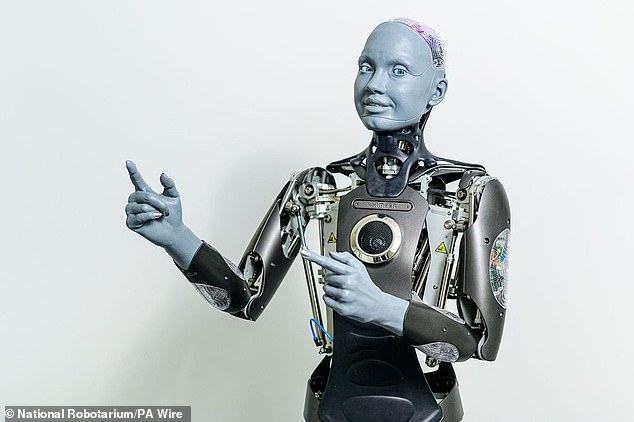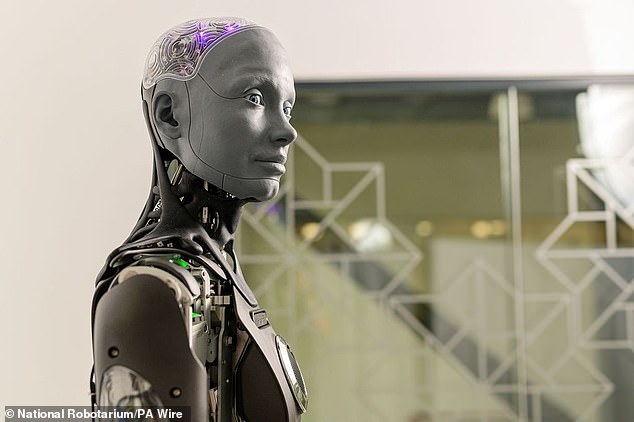The world’s most advanced humanoid robot Ameca will go on display in Scotland to ‘demystify complex technologies’
- Ameca is able to ‘interact with people in a natural and interesting way’
- The acquisition aims to ‘promote a better understanding of the benefits of robotics’
A humanoid robot described as the most advanced in the world will go on display in Scotland.
The National Robotarium, the UK center for robotics and artificial intelligence (AI), based at Heriot-Watt University in partnership with the University of Edinburgh, has purchased the robot, called Ameca, from Engineered Arts.
Ameca is described as being able to “interact with people in a natural and engaging way,” and facial expressions include “playful” and “pensive.”
The acquisition is an effort to “demystify complex technologies and promote a better understanding of the potential benefits of robotics and AI.”
The robot has built-in microphones, cameras, facial recognition software and articulated motorized components.
A humanoid robot described as the most advanced in the world will go on display in Scotland

The National Robotarium, the UK center for robotics and artificial intelligence (AI), based at Heriot-Watt University in partnership with the University of Edinburgh, has purchased the robot, called Ameca, from Engineered Arts
The National Robotarium hopes to break down barriers and build trust between humans and robots by exhibiting Ameca in schools and workshops to allow people of all ages to interact directly with the robot and learn about the latest developments in the field of robotics and AI.
The facility is backed by £21 million from the UK Government and £1.4 million from the Scottish Government in a bid to make Edinburgh the data capital of Europe.
Researchers will also use Ameca to study public perception and attitudes towards humanoid robots and gather valuable insights to inform the development of future technologies that prioritize trust, transparency and user-friendliness.
Steve Maclaren, Chief Operating Officer at the National Robotarium, said: “Ameca’s arrival at the National Robotarium marks a significant step forward in our mission to make robotics more accessible and relatable to the people of Scotland, the UK and beyond.
“Since opening our doors in September 2022, we have successfully hosted more than 100 in-person and virtual events and engaged thousands of school-age children.

The National Robotarium hopes to break down barriers and build trust between humans and robots by exhibiting Ameca in schools and workshops to allow people of all ages to interact directly with the robot and learn about the latest developments in the field of robotics and AI.
“Ameca represents an exciting opportunity to build on that success and take public engagement to the next level.
‘By giving people the opportunity to interact firsthand with this state-of-the-art humanoid robot, we aim to demystify robotics, promote trust in human-robot interaction and demonstrate the remarkable potential of these technologies to improve our daily lives and benefits society as a whole.’
Will Jackson, Founder and CEO of Engineered Arts Ltd, said: “We are incredibly proud that Ameca is joining the many leading robots at The National Robotarium.
“Encountering an AI-embodied humanoid robot is a unique experience that very few people have witnessed and we are very excited to share this profound moment with a wider audience.”
